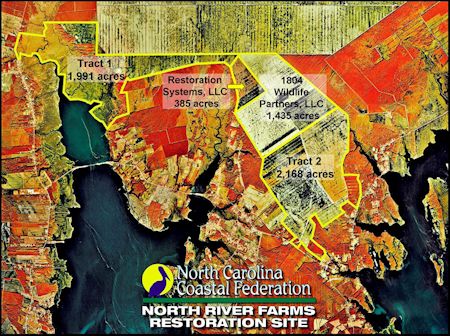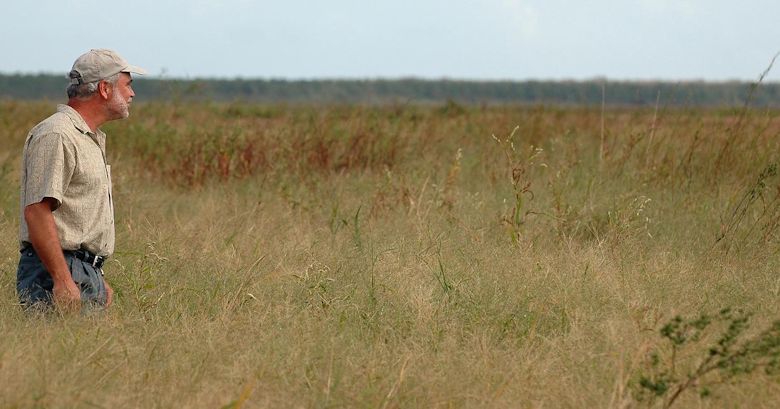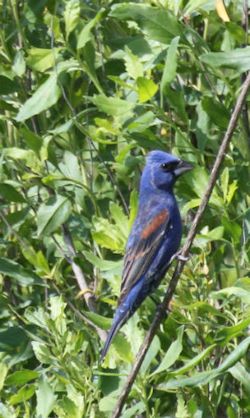 The various pieces that make up the restoration project at North River Farms are outlined in yellow. The federation sold an easement on Tract 2 to the federal government and will use some of the money to buy the adjoining 1804 Wildlife Partners tract that private investors bought and restored. |
SMYRNA — The N.C. Coastal Federation last week put in place one of the final pieces of the puzzle that will eventually restore water quality and provide public access to thousands of acres of restored wetlands at its North River Farms property in Down East Carteret County.
Todd Miller, executive director of Carteret County-based nonprofit, said the federation closed on the sale of a permanent conservation easement for the land to the Natural Resources Conservation Service, a part of the U.S. Department of Agriculture.
Supporter Spotlight
After legal and other expenses, the sale of the easement on 2,168 acres that the federation bought in 2002 will bring the organization about $3 million, which can now be used for additional conservation work on the property, which is off U.S. 70 near of the road to Harkers Island.
Coincidentally, that was almost exactly the price the federation paid for the property, which was its second chunk of land at the farm. The whole project – the largest wetlands restoration project ever in North Carolina and one of the largest in the nation – began in 1999 when the federation bought 1,991 acres at the farm for $1.07 million, with a grant from the N.C. Clean Water Management Trust Fund, a then-thriving and now endangered taxpayer-funded agency that also funded the second purchase.
According to Miller, part of the $3 million from the easement sale will most likely be used to purchase an additional 1,435 acres bought by private investors, 1804 Wildlife Partners LLC, a hunters’ group. The federation then intends to enroll the land in a federal program that protects wetlands. That land is now restored as wetlands, and is rich in wildlife.
The federation, Miller said this week, is in negotiations with 1804 Partners, with the likely goal of putting all or nearly all of the farm property under unified ownership.
“When we bought the (2,168 acres) back in 2002, part of the negotiations gave the farmer 10 more years to keep farming,” Miller said. “We also structured it to keep it eligible for the NRCS program when the farming ended.”
Supporter Spotlight
The end result is that the federation still owns the land, but recouped the purchase price through the sale of the easement. The same thing could have been done with the original purchase of 1,991 acres, but the group didn’t know that at the time.
“In this whole process, we were working not only with the state but also with private enterprises that knew about this federal program,” Miller said. “By the time we got to the 2002 purchase, we had learned our lesson and knew about it, too.”
Although private investors often take advantage of the federal program, which is intended to help turn key wetlands that had been converted into farmlands back into wetlands, Miller said he believes this latest twist in the North River Farms saga is unique in terms of state and nonprofit involvement.
The result, he said, is that the federation can use the money to do additional conservation work, but it has to get permission from the state trust fund that provided the original acquisition grant.

Todd Miller walks through waist-high grass along a restored portion of North River Farms.
That shouldn’t be any problem, since trust fund officials are longtime big believers in the North River project.
“We’re very excited,” said Richard Rogers, director of the agency. “We’re already seeing tremendous improvements in the water quality in the watershed, and anything that can be done to leverage funds to continue to improve quality in the White Oak River basin is a great thing.”
The trustees and staff of the CWMTF, Rogers added, “very much appreciate the leadership and the vision of the federation, and Todd in particular. They have done great things, and we want to do all we can to help that continue.”
Miller said the federal government will take the lead in designing the restoration of the land under the easement, working closely with the federation, which has already successfully restored the tract it purchased in 1999.
While the work is under way, he said, it will be necessary to control access to the property, but it will be possible for groups and even individuals to work through project manager Lexia Weaver at the federation to engage in some activities, such as bird-watching and research.
 Richard Rogers |
Eventually, he said, the federation will need to decide how to manage the restored wetlands so that they can be open for public use. “We may decide to ask the Wildlife Resources Commission to manage the land as gamelands,” he said. “Whatever happens,” he said, “North River Farms will eventually be open for public use.”
It has been and still is a tremendous undertaking, and the end result could be comparable to other large refuges for fish and wildlife such as near Lake Mattamuskeet. But a key is that North River Farms is not nearly so remote; it’s accessible in an hour or less from Morehead City and Bogue Banks, which draws hundreds of thousands of visitors every year.
All kinds of activities are possible, including hunting, birding, hiking, kayaking and fishing. Undoubtedly there will be a trail system. Then, of course, there is continued research and education. Countless students have helped in the project by planting marsh grass in the reconstructed wetlands, and school groups will surely benefit from more public access. In addition, Miller said, many graduate students have earned masters and doctoral degrees in part through research at the farm, and that will continue.
In the meantime, even as the project is underway, there’s a great opportunity for research into the ecology, Miller said. Scientists can look at the ecology now and compare it to what it will be in a few years in order to document “what we fully expect to be continued great improvements” in the water quality in Wards Creek, North River and Jarrett’s Bay, among others.
Although there is still a tremendous amount of work to be done, Miller, with a little prodding, expressed some justifiable pride in what has been, in essence, a large part of his life’s work for more than 15 years.
 This blue grosbeak is one of the many species of birds that can be found in the restored wetlands at North River Farms. Photo: Sam Bland |
“It does feel good,” he said. “What’s especially nice is not just that it’s going to be accessible to the public, but that we have seen great improvements in the water quality, which was the point to begin with. We’ve seen a big increase in the oyster population in North River for example, and there have been measureable improvements in water quality.”
It’s easy to see why.
Rogers, the CWMTF director, called the project both complex and historic.
“When it started, it was the largest restoration project in the country, and it’s still one of the largest,” he said. “Throughout the project, the federation has had a vision commitment to doing it right, and that’s a credit to Todd and the staff.
“We’re proud to have been a part of it and to continue to be a part of it. We got involved in it – way before I was here – because of the water quality aspect. That’s a public benefit, of course. But providing public access is a tremendous added value. It’s been a pretty big public investment and it’s great that the public will be able to enjoy it.”
Miller also gave credit to others who have been involved, and there are many. Among them are U.S. Fish and Wildlife Service, EPA, FishAmerica Foundation, N.C. Albemarle-Pamlico National Estuary Program and the N.C. Ecosystem Enhancement Program. Universities, including N.C. State, have also been involved, through planning, design and research and monitoring. There are other private partners in addition to 1804. For example, example, Backwater Environmental, a Pittsboro company, recently completed restoration of 385 acres of the farm that it bought years ago. The N.C. Coastal Land Trust has also been a good partner, Miller said.
A stunning array of birds and wildlife is available for viewing, and more will follow. The restored wetlands area could eventually lure a million snow geese.
The entire North River Farms project will eventually involve the planting of more than 1 million trees and other wetlands plants. Up to 5,100 acres of the 6,000-acre farm will be restored to wetlands.
Miller said that despite all the talk about vision, when the effort began, he really didn’t know how it would end. He did know that there were threats to the area – Atlantic Beach at one time was discussing a plan to build a sewage treatment system and discharge it at nearby Open Grounds Farm – and he knew wetlands restoration would aid the water quality, which would help the fishermen and others who depend on the ecosystem’s health.
“To be honest,” he said, “We got started and then we just kept plugging along, trying to make some things work. We learned a lot as we went along. We’ve had a lot of great people – ours and from agencies – involved. Luckily, things just fell into place.







